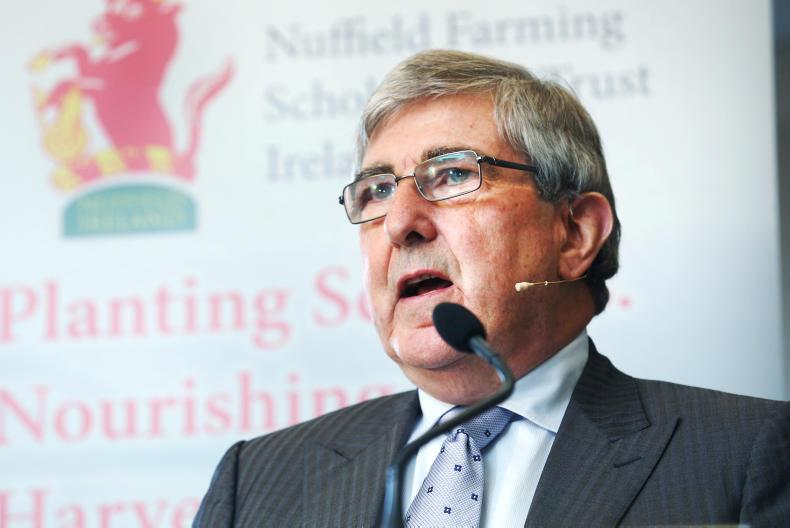“It doesn’t matter if you are a team of two running a farm or 20,000 people running Kerry. It is the same thing,” former Kerry Group CEO and chair Denis Brosnan told the Nuffield agriculture conference in Castleknock Hotel on Friday.
"You wake up in the morning and ask yourself what will this place look like five to 10 years from now?
"If you want to be happy in life, you must have a vision of what you want to do some number of years from now
He said the correct choice of leader is what separates success from failure.
“Leaders are those who influence the activity of other people,” Brosnan said, criticising the British prime minister Theresa May’s style of leadership.
“If you think you are a leader, but you are not influencing people or no one is following you, there is no point in living in that cloud by yourself.”
Better than you
In Kerry, he said they tried to instil in managers that ‘your job is to find someone that can do it better than you can’.
If not, you become the hindrance in the organisation rather than the one pushing it forward.
“Never underestimate the ingenuity of individuals. Never tell people how to do things; tell them what needs to be done and to go away and figure it out yourself.
"You will be surprised with the ingenuity and the job satisfaction that comes from that.”
But, he says, there is little point in being a leader if it doesn’t bring about success. Success needs a vision, a strategy and a structure.
“Strategy can only come about by having a vision. There must be a structure so everyone knows what they are doing. There must be clarity so everyone is clear on what they are doing.”
10 principles for success
1 Be clear on and write down your short- and long-term goals.2 Select a maximum of 10 key issues which you and each of your colleagues must concentrate on in order to achieve the goals set.3 Know your core competencies – continually recheck your SWOT analysis.4 Continually monitor progress – strengths improved, weaknesses eliminated, issues resolved.5 Keep things simple.6 Learn how to eat the elephant.7 Use loose brick theory.8 Would the organisation be more or less profitable without you or any of your colleagues.9 Clearly understand and react quickly to your business environment – for ultimate success, sense the future.10 Remember, change is continuous; an organisation must be responsive and flexible in the management of change. Read more
Brosnan returns to his roots
Journal vet Tommy Heffernan talks calf sheds with Nuffield scholar Brian Rushe.
“It doesn’t matter if you are a team of two running a farm or 20,000 people running Kerry. It is the same thing,” former Kerry Group CEO and chair Denis Brosnan told the Nuffield agriculture conference in Castleknock Hotel on Friday.
"You wake up in the morning and ask yourself what will this place look like five to 10 years from now?
"If you want to be happy in life, you must have a vision of what you want to do some number of years from now
He said the correct choice of leader is what separates success from failure.
“Leaders are those who influence the activity of other people,” Brosnan said, criticising the British prime minister Theresa May’s style of leadership.
“If you think you are a leader, but you are not influencing people or no one is following you, there is no point in living in that cloud by yourself.”
Better than you
In Kerry, he said they tried to instil in managers that ‘your job is to find someone that can do it better than you can’.
If not, you become the hindrance in the organisation rather than the one pushing it forward.
“Never underestimate the ingenuity of individuals. Never tell people how to do things; tell them what needs to be done and to go away and figure it out yourself.
"You will be surprised with the ingenuity and the job satisfaction that comes from that.”
But, he says, there is little point in being a leader if it doesn’t bring about success. Success needs a vision, a strategy and a structure.
“Strategy can only come about by having a vision. There must be a structure so everyone knows what they are doing. There must be clarity so everyone is clear on what they are doing.”
10 principles for success
1 Be clear on and write down your short- and long-term goals.2 Select a maximum of 10 key issues which you and each of your colleagues must concentrate on in order to achieve the goals set.3 Know your core competencies – continually recheck your SWOT analysis.4 Continually monitor progress – strengths improved, weaknesses eliminated, issues resolved.5 Keep things simple.6 Learn how to eat the elephant.7 Use loose brick theory.8 Would the organisation be more or less profitable without you or any of your colleagues.9 Clearly understand and react quickly to your business environment – for ultimate success, sense the future.10 Remember, change is continuous; an organisation must be responsive and flexible in the management of change. Read more
Brosnan returns to his roots
Journal vet Tommy Heffernan talks calf sheds with Nuffield scholar Brian Rushe.










SHARING OPTIONS